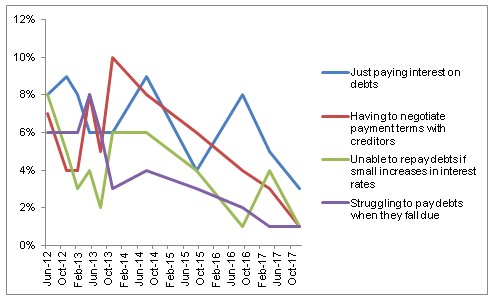
UK ‘zombie business’ numbers drop to record low – R3
03 January 2018
The proportion of UK companies which are only paying the interest on their debts - one of the signs of a so-called 'zombie' business - has dropped to 3% in December from 5% in April this year, according to research by R3, the insolvency and restructuring trade body.
The proportion of businesses only paying interest on their debts - equivalent to 49,000 firms - is now the lowest it has been since R3 began tracking 'zombie businesses' in June 2012. It had reached as high as 9% in November 2012 and August 2014; prior to April's 5% it was 8% in September 2016.
R3's research, based on interviews with 500 nationally representative businesses by BDRC, also found that other signs of acute distress have dropped to record or near-record lows.
Just 1% of UK companies report they are having to negotiate payment terms with creditors, are unable to repay debts if there was a small increase in interest rates, or are struggling to pay debts when they fall due.
Duncan Swift, deputy vice-president of R3, says: "Although the wider economic picture isn't an optimistic one, fewer UK companies appear to be struggling to meet some key immediate financial obligations than in recent months.
"The fall in businesses only paying the interest on debts comes despite the first rise in UK interest rates in a decade. Instead, it may be that November's modest rate rise concentrated directors' minds and, with the prospect of further rises in the near future, may have prompted businesses to deleverage or refinance now to avoid future pain.
"With the growth of alternative lending providers over the past five years, including peer-to-peer lending and growing private equity interest in distressed businesses, it has become easier for struggling businesses to move out of immediate financial danger.
"Also feeding into this is economic uncertainty, which may be putting off businesses from investing or expanding. This frees up cash for paying down debt, albeit at the cost of long-term productivity improvements."
Duncan Swift adds: "Another factor is simply that, with corporate insolvencies edging upwards over the last 18 months, some of those companies struggling earlier in the year have ceased to trade or gone through a rescue process. A recent OECD report found the UK had the group's best insolvency and restructuring framework for dealing with the 'zombie' business phenomenon, which has helped keep 'zombie' numbers lower in the UK than elsewhere.
"Whether this is the 'end' of the zombie businesses is another question though. Almost a decade on from the last recession, there appears to be fewer zombie businesses around now that any point in that recession's aftermath. But this doesn't mean they're gone forever. Those businesses which have refinanced may not be any more productive and may have put problems off for a later date, while a serious financial downturn could easily create a new group of 'zombie businesses'."
Other distress signs drop, but growth and optimism remain low
R3's December research also saw other signs of business distress fall back from a recent upward trend, with 16% of UK businesses reporting at least one of five problems (decreased profits, reduction in sales volumes, regular use of maximum overdraft, recent fall in market share, making redundancies).
In September 2017, 25% of businesses had reported one of these signs of distress, up from 20% in April 2017 and 21% in September 2016.
However, the research also found that levels of business growth remain flat and well below record highs. 55% of UK businesses report at least one sign of growth (increased sales volumes, increased profits, investing in new equipment, market share growth, business expansion) compared to the high of 69% seen in December 2015 and June 2016.
Businesses' economic pessimism is also continuing to rise with 27% of businesses now more pessimistic than they were 3 months ago - the highest this figure has been March 2013. 40% of businesses are more optimistic than 3 months ago, but this is the lowest this figure has been since March 2013.
Likewise, 9% of businesses expect their activity to decrease in the next year, the highest this has been since December 2011.
Duncan Swift comments: "The improvement in distress levels is welcome, but with growth subdued and rising pessimism, it's not clear how long this improvement might last."
The proportion of UK businesses which are...


Source: R3/BDRC
The proportion of UK businesses which are more optimistic/pessimistic about the economy than three months ago

Source: R3/BDRC
- Research undertaken by BDRC, an award-winning insight agency. Questions were put to 500 UK businesses via BDRC's monthly Business Opinion Omnibus. Telephone-based interviews with a nationally representative sample of senior financial decision makers across the UK, weighted by size, region and sector. Fieldwork dates 27th November to 7th December 2017

- R3 Blog Member news, commentary and analysis from R3
- Policy & Research Insights into the economy and the insolvency and restructuring, and recommendations for reform
- Consultation Responses Our responses to Government consultations on insolvency and restructuring issues
R3 members can provide advice on a range of business and personal finance issues. To find an R3 member who can help you, click below.

 Stuart McBride
Stuart McBride Amelia Franklin
Amelia Franklin Lyle Horne
Lyle Horne
